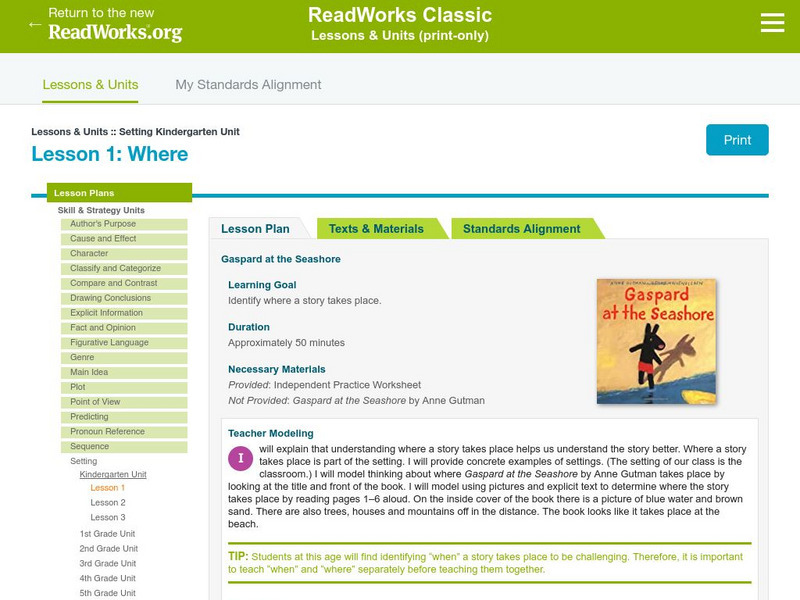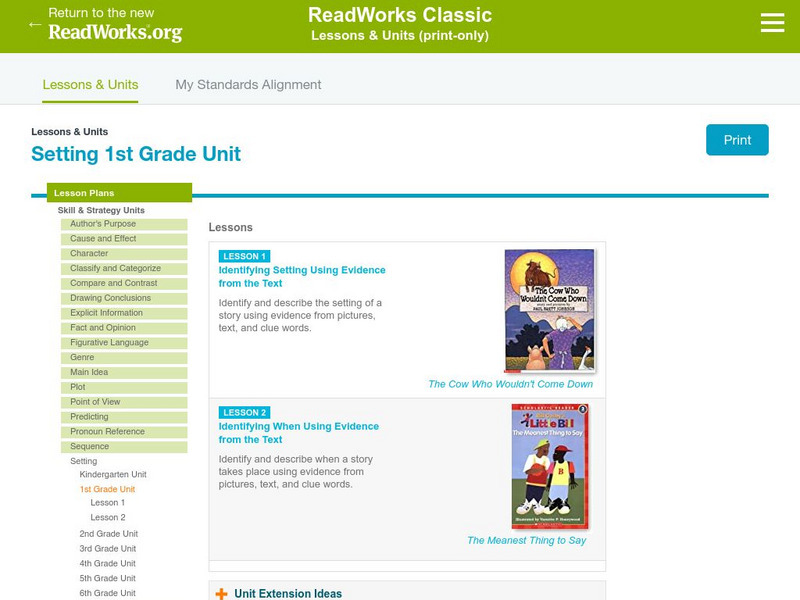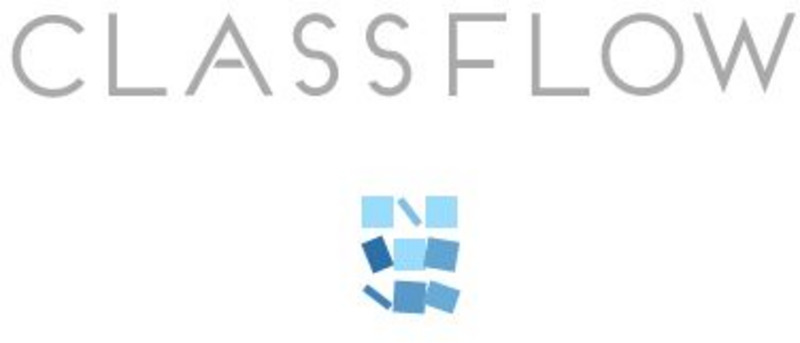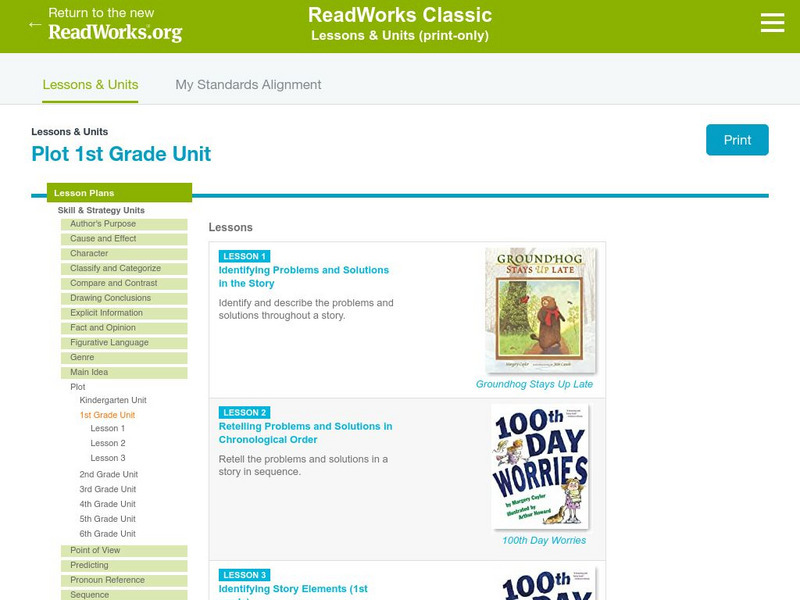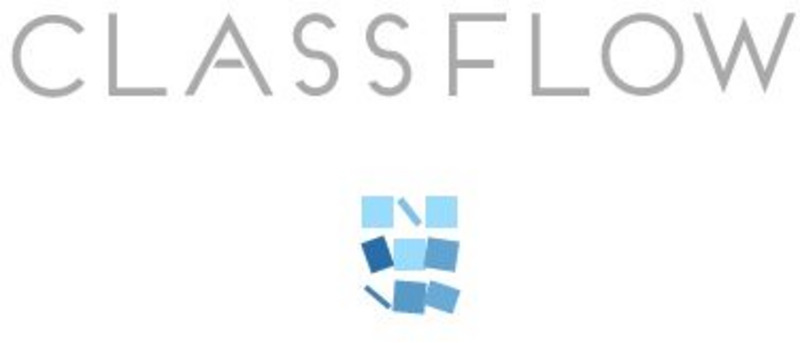Hi, what do you want to do?
Curated OER
Class Bear Book
Students discover writing their own name with the help of "Brown Bear, Brown Bear. What Do You See?" to create context for the lesson. They create a page for a class book with the help of the teacher. The dialogue for the new book is...
Curated OER
The Life Cycle of the Butterfly
Students examine the life of a butterfly. They write a biography from the point of view of a caterpillar using new vocabulary. They use magnifying glasses to examine butterflies and caterpillars.
Curated OER
Kindergarten Holocaust Unit
Students determine that we are the same. They discuss that we have differences and realize our differences make us special. They recall the ways in which human beings and Sesame Street characters are alike. They create a second...
Better Lesson
Better Lesson: rl.k.3 With Prompting and Support, Identify Characters, Settings,
This landing page provides different lesson plan choices on teaching RL.K.3 With prompting and support, identify characters, settings,
Read Works
Read Works: Grade 2: Two Lesson Unit: Setting
[Free Registration/Login Required] A set of two lesson plans designed to teach students to use context clues to identify the setting and changes within it. Lessons are based on the books Bigmama's by Donald Crews and The Stories Julian...
Read Works
Read Works: Setting Kindergarten Unit: When (Seasons, Day, or Night)
[Free Registration/Login Required] A lesson plan, based on Look! Snow! by Kathryn O. Galbraith, in which students learn how to utilize text and picture clues to determine basic time elements of setting in a story. Students follow this...
Read Works
Read Works: Setting Kindergarten Unit: Where
[Free Registration/Login Required] Use the book Gaspard at the Seashore by Anne Gutman to teach clues students can use to determine where a story takes place. The book must be provided by the teacher, but downloadable worksheets for...
Read Works
Read Works: Setting 1st Grade Unit
[Free Registration/Login Required] A series of three lesson plans designed to teach students to use pictures and word clues to determine the setting of fiction texts. Lessons are based on the books The Cow Who Wouldn't Come Down by Paul...
Read Works
Read Works: Setting Kindergarten Unit: Where and When
[Free Registration/Login Required] Based on Knuffle Bunny by Mo Willems, a lesson in which young scholars learn how to utilize text and picture clues to determine a when and where the story takes place.
Success Link
Success Link: Characters, Setting, Plot, Conclusion, and Summarizing a Story
This lesson plan offers a step-by-step procedure for teaching students how to identify story elements and to summarize a story. It explains how to use a "Who Am I" activity, as well as a linkage activity in identifying characters and...
Birmingham Grid for Learning (UK)
Birmingham Grid for Learning: Story Time
Five familiar children's stories have been adapted and illustrated for this site. Students may "read along" and identify settings, characters, sequencing, and more. It also provides printable worksheets, copies of the text and the...
ClassFlow
Class Flow: Setting
[Free Registration/Login Required] This flipchart introduces setting to students using picture clues first and then using only contextual clues. Activotes are also used to check for understanding.
Read Works
Read Works: Plot 1st Grade Unit
[Free Registration/Login Required] A series of three lesson plans designed to teach students to identify problems and solutions in fiction text and to retell a story's problem and solution in sequence. Students learn to identify the plot...
Alabama Learning Exchange
Alex: Reading and Writing About Miss Moo
Lesson for early elementary and special education students utlizing the book Miss Moo Goes to the Zoo by Kelly Graves and graphic organizers to identify elements in a story (title, author, setting, characters, etc.). Students participate...
Other
The Official Flat Stanley Project
Remember the story Flat Stanley that has been around for over 40 years? Well, now there is an opportunity to make your own Flat Stanley and send him from your class to another class somewhere else in the world. The project was started in...
ClassFlow
Class Flow: Annie and the Wild Animals Project
[Free Registration/Login Required] This lesson contains pre- and post-reading activities for Jan Brett's Annie and the Wild Animals. Students identify setting and animal characters from the story and learn about Scandinavia (where the...
Read Works
Read Works: Grade 2: Two Lesson Unit: Theme
[Free Registration/Login Required] A set of two lesson plans designed to teach students to use story elements to identify theme and to match a given theme to a story. Lessons are based on the book Aesop's Fables by Jerry Pinkney....
Utah Education Network
Uen: Lesson Plan: Why Do We Need Rules?
Lesson that helps young scholars understand why rules are needed. Students discuss the story Know and Follow Rules by Cheri J. Meiners, compare the rules in the book to rules at home and at school, and develop a list of rules for the...
ReadWriteThink
Read Write Think: Exploring Character Through Images
This lesson plan explores Curious George in relation to images conveying character. Included in the lesson plan is an overview, practice, objectives, resources, preparation, and more.











